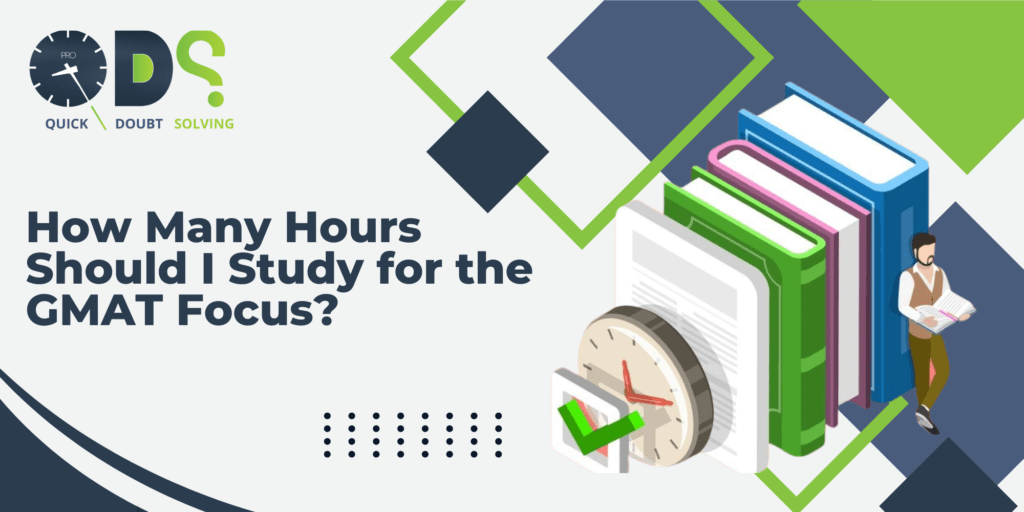Many individuals preparing for the GMAT Focus often wonder about the ideal study hours required. This question is quite tricky. Students have diverse backgrounds, skill levels, and GMAT score objectives. Moreover, students have different levels of work, family, and personal commitments, learning speeds, and access to GMAT prep materials.
The time it takes to prepare for the GMAT varies depending on the individual. Answering this question involves considering and evaluating numerous factors. For those beginning their GMAT preparation, this article will discuss the factors to consider when estimating your GMAT preparation time and more.

Factors that influence GMAT Preparation Time
Before estimating GMAT preparation time, it’s essential to understand the factors influencing it and have specific answers to the following questions:
- What is your current level of preparedness?
- What GMAT score are you aiming for?
- What resources do you plan to use for your preparation?
- Determine how much time you have to study each day and get started with your learning styles.
Begin With Your Objective in Mind
Before you create your GMAT Focus study strategy, you should first decide your GMAT score objective. After all, the length of your preparation time may be determined by your desired score. If you want to get to 715, it will take more time than getting to 655.
If you’re unsure what score you want, look up GMAT scores at the places you want to attend. For example, do you intend to apply to a full-time M7 school? You will most certainly require a better GMAT score than if you intend to apply to a top 30 part-time program.
Analyze Your Present GMAT Focus Level
If you are taking the GMAT for the first time, you can estimate your current level of preparation using one of the ways listed below:
- Official Guide to the GMAT
- GMAT Prep Mock Tests
If you’ve previously taken the GMAT, find out how to use your Official Score Report/Enhanced Score Report to determine your current level of preparation.
Next, we’ll take a quick look at each of the strategies and their benefits before recommending the most accurate way that includes the above resources.
The GMAT Official Guide has a diagnostic test in printed and online versions. These materials were created by GMAC, the corporation that owns and designed the GMAT test. The diagnostic test is a fantastic beginning point for understanding your strengths and limitations, and it will assist you in prioritizing your areas of concentration throughout preparation and while developing your study plan. It has almost 150 questions for Quant, Verbal, and Data Insights.
GMAT Prep Mock Tests: GMAC also provides an official beginning kit, which includes two practice examinations.
- GMAT Classic Edition Official Starter Kit + Practice Tests 1&2 – This kit includes 90 questions and two practice tests.
- GMAT Focus Edition Official Starter Kit + Practice Tests 1&2 – This kit consists of 70 questions and two practice tests.
These practice examinations include questions formerly used on GMAT tests but now defunct. Furthermore, they employ the exact scoring mechanism as the genuine GMAT tests.
What resources do you plan to use for your preparation?
The time needed for GMAT preparation can vary based on your chosen resources: books, video lessons, or instructor-led classroom coaching.
Most students who commit to their GMAT preparation stay consistent, utilize a data-driven online course, and require around 7 hours of study for every 10-point increase in their total GMAT score.
If you are using books for GMAT preparation, plan on dedicating around 12 hours for every 10-point increase on a scale of 805.
The figures above are based on the assumptions made regarding your preparation:
- Consistently study without taking extended breaks from preparation, such as pausing for over a week due to other commitments.
- You study with just one resource.
- You stick to one study plan without constantly switching between topics like Sentence Correction, Critical Reasoning, and Quant.
In addition to learning the concepts tested in the GMAT, you must consider the time required for taking mock tests to condition and refine your preparation strategy.
Therefore, selecting the correct resources for GMAT preparation can decrease the time needed to prepare for the GMAT.
GMAT Timeline
We are assuming the following two things when we make our estimates:
- You put in 15 study hours per week.
- You are following many of the study guidelines made later in the article.
Indeed, you can beat our estimates if you work harder at getting ready. In these circumstances, we provide the average GMAT Focus preparation time.
You need a 50-80 point increase for a GMAT focus score of less than 615
You currently have a 525 and want to raise your score to between 575 and 605. Most students need 180 hours (or three months) to enhance their GMAT Focus score by 50-80 points.
Total GMAT Preparation Time: 180 hours
You need a 100-150 point increase for a GMAT score of less than 655
You presently have a 505 and want to raise your score to between 605 and 655. Most students need 300 hours of practice, or five months, to enhance their GMAT Focus score by 100-150 points.
Total GMAT Preparation Time: 300 hours
You need a 50-80 point increase for a GMAT Focus score greater than 655
You presently have a 605 and want to raise your score to between 655 and 685. Most students would require 240 hours, or four months, to enhance their GMAT Focus score by 50-80 points.
Total GMAT Preparation Time: 240 hours
For a GMAT Focus Score Higher than 655, You Need to Gain 100–150 Points
You currently have a 605 and want to raise your score to between 705 and 755. Most students need 360 hours (or six months) to enhance their GMAT Focus score by 50-80 points.
Total GMAT Preparation Time: 360 hours
Remember that these are average times to study for the GMAT Focus under various conditions. Your unique circumstances influence how long you need to prepare.
For example, you could be a lightning-fast learner with a strong aptitude for GMAT Focus subjects and abilities. You may have time to devote more than 15 hours of study every week. In some circumstances, your study timeframe may be shorter than I stated above.
On the other hand, you might learn slower or have a weaker ability for GMAT Focus subjects and skills. Or you’re a busy working professional with little study time. You may need a more extended schedule than I’ve described in certain circumstances. However, you can still attain your score target!
How do you make a study plan for the GMAT preparation and keep track of your progress?
If you are short on time and need to take the GMAT soon, a custom study plan can help you cut your prep time by up to 40 hours or more.
Otherwise, if you have enough time to prepare for the GMAT, a study plan can help you score 50 points more than you would if you studied without one. It will also increase your chances of admission to elite universities and help you obtain scholarships and fellowships for your MBA.



